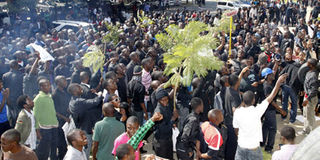Zambia frees 31 students held over food subsidy protests

Students of the University of Zambia protest against the governments removal of fuel and mealie meal subsidies on May 17, 2013 in Lusaka. Zambian President Michael Sata ordered police to arrest and expel the students who were protesting. AFP PHOTO / STRINGER
What you need to know:
- Hundreds of students from the University of Zambia had marched to President Michael Sata's office on Friday, demanding an audience with him.
- The opposition leader has himself been arrested twice this year for allegedly making defamatory remarks about Sata and inciting violence.
LUSAKA
Zambia police on Saturday freed the 31 university students detained on the president's orders after they staged protests against the government's decision to scrap staple food subsidies.
"All the students have been released after paying an admission of guilty fee of 22,500 kwacha (about $4)," police spokeswoman Elizabeth Kanjela told AFP. She did not specify what they were guilty of.
Hundreds of students from the University of Zambia had marched to President Michael Sata's office on Friday, demanding an audience with him.
But Sata, who was away from the capital, ordered the police to arrest them. He also told the minister of education to expel the students from the university.
Hakainde Hichilema, leader of the country's second-largest opposition party, the United Party for National Development (UPND), had earlier called on Sata to unconditionally free the students.
Hichilema said Sata's administration had "failed to govern this country and now they are arresting everybody including students".
The opposition leader has himself been arrested twice this year for allegedly making defamatory remarks about Sata and inciting violence.
The decision early this week to scrap subsidies for staples like corn meal sparked an outcry in the country where 60 percent of the population live in poverty, with an average income of $3.45 a day.
Sata swept to power in 2011 on a populist vote, promising to end poverty, but his new move could hit the poor the hardest and fuel inflation.
In 1990, then president Kenneth Kaunda's government was rocked by food riots, which saw him lose power.




